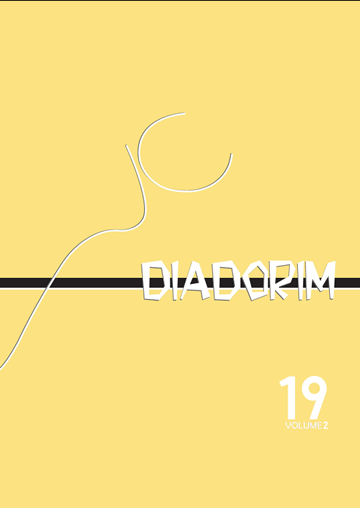The Teaching of Verbs in High School Based on Linguistic Functionalism
DOI:
https://doi.org/10.35520/diadorim.2017.v19n2a10399Keywords:
Verb, Functionalism, Grammaticalization, Verbal clutches.Abstract
Te objective of this work is to present some Functionalist contributions to the teaching of verbs in High School. It is understood that the emphasis in the examination of the flexional aspects of this class of words in the classroom tends to make mechanical the student's analytical capacity, not only in relation to the examination of the verb category, but of the entire language, so as not to pay attention to the semantic and discursive-pragmatic aspects involved in the use of language. As a result, frstly, we tried to problematize the concept of the verb category based on some textbooks. Ten, three important functionalist contributions were presented for the treatment of this class of words: 1) prototyping and grammaticalization in verbs, 2) the transitivity gradient, and 3) verbal clutches. As results, it was verifed that some functionalist concepts, together with the proposal of Fiorin (1996), provide fundamental reflections not only to think productive and critical teaching of the verb category, but also to understand more general aspects related to the organization of the language itself.References
ABAURRE, Maria Luiza; ABAURRE, Maria Bernardete; PONTARA, Marcela. Português: contexto, interlocução e sentido. São Paulo: Moderna, 2013.
ANTUNES, Irandé. Muito além da gramática. São Paulo: Parábola, 2007.
BERTOQUE, Lennie Aryete Dias Pereira. A funcionalidade de construções de voz em títulos de notícia e em manchetes de jornais impressos. Goiânia, 2010. 205 p. Dissertação de Mestrado -- Faculdade de Letras da Universidade Federal de Goiás (FL/UFG).
BIZZOCCHI, Aldo. O darwinismo da linguagem. Língua Portuguesa, ano 3, n. 33l, p. 56 58, jul. 2008.
BYBEE, Joan. Cognitive Processes in grammaticalization. In: TOMASELLO, Michael. (Ed.). The new psychology of language: cognitive and functional approaches to language structure. Mahwah: Lawrence Erlbaum, 2003. p. 145-167.
CÂMARA JR, Joaquim. A classificação dos vocábulos formais. In: CÂMARA JR. Estrutura da língua portuguesa. Petrópolis: Vozes, 2001. p. 77-80.
CASSEB-GALVÃO. Vânia Cristina. A teoria da valência aplicada ao trabalho de revisão de textos. In: Anais on-line do I SIMELP. São Paulo, USP, 2008.
CEZÁRIO, Maria Maura. A integração de orações com os verbos querer, mandar e deixar. In: Cadernos do CNLF, série IV, n.2, 2000. Disponível em: <http://www.filologia.org.br/anais/anais%20iv/civ02_43-58.html>. Acesso em: 15 nov. 2014.
CORÔA, Maria Luiza Monteiro Sales. O tempo nos verbos do português. São Paulo: Parábola Editorial, 2005.
DISCURSO & GRAMÁTICA. Disponível em: <http://www.letras.ufrj.br/discursoegramatica>. Acesso: 29 nov. 2014.
FERREIRA, Mauro. Aprender e praticar gramática. São Paulo: FTD, 2003.
FIORIN, José Luiz. As astúcias da enunciação: as categorias de pessoa, espaço e tempo. São Paulo: Ática, 1996.
_______. (Org.). Introdução à linguística: I Objetos teóricos. São Paulo: Contexto, 2002.
FURTADO DA CUNHA, Maria Angélica; SOUZA, Maria Medianeira. Transitividade e seus contextos de uso. São Paulo: Cortez, 2011.
GERALDI, João Wanderley. Portos de passagem. 4 ed. São Paulo: Martins Fontes, 1997.
HOPPER, Paul J. Emergent grammar. Berkeley Linguistics Society, v. 13, 1987. p. 139-57. Disponível em: <http://elanguage.net/journals/index.php/bls/article/viewFile/2492/2459%E5%AF%86>. Acesso em: 03 out. 2014.
______; THOMPSON, Sandra A. Transitivity in grammar and discourse. Language, v. 56, p. 251-299, 1980.
MATTOS e SILVA, Rosa Virgínia. Tradição gramatical e gramática tradicional. São Paulo: Contexto, 1994.
NASCIMENTO, Simone Maria Barbosa Nery; CALSA, Geiva Carolina. Contribuições do funcionalismo no ensino de transitividade verbal e conceito de professores do ensino fundamental sobre o tema. In: CELLI -- COLÓQUIO DE ESTUDOS LINGUÍSTICOS E LITERÁRIOS, v.3, p. 2119-2128, 2009. Disponível em: < http://www.ple.uem.br/3celli_anais/trabalhos/estudos_linguisticos/pfd_linguisticos/101.pdf>. Acesso em: 03 maio 2017.
NEVES, Maria Helena de Moura. Gramática na escola. São Paulo: Contexto, 1990.
______. Gramática de usos do português. São Paulo: Editora Unesp, 2000.
______. A gramática: história, teoria e análise, ensino. São Paulo: Editora da UNESP, 2002.
______. Texto e gramática. São Paulo: Contexto, 2006.
______. Ensino de língua e vivência de linguagem: temas em confronto. São Paulo: Contexto, 2010.
OLIVEIRA, Mariângela Rios; WILSON, Victoria. Linguística e Ensino. In: MARTELOTTA, Mário Eduardo (org.). Manual de Linguística. São Paulo: Contexto, 2011. p. 235-242.
PCN+. Orientações Educacionais Complementares aos Parâmetros Curriculares Nacionais. BRASIL. Ministério da Educação e Cultura (MEC). Disponível em: <http://portal.mec.gov.br/seb/arquivos/pdf/linguagens02.pdf>. Acesso em: 28 nov. 2014.
PINILLA, Maria Aparecida M. Classe de palavras. In: VIEIRA, Silvia Rodrigues; BRANDÃO, Silvia Figueiredo (orgs.). Ensino de Gramática: descrição e uso. São Paulo: Contexto, 2007. p. 169-182.
SAUSSURE, Ferndinand de. Curso de Linguística Geral. Trad. Antônio Chelini, José Paulo Paes e Izidoro Blikstein. São Paulo: Cultrix, 2006.
SILVA, Leosmar Aparecido da. Corporificação da mente: prototipia e gramaticalização em construções do português brasileiro. In: Anais SIELP, v. 1, n. 1, p. 473-472, 2011. Disponível em: <http://www.ileel.ufu.br/anaisdosielp/pt/arquivos/sielp2011/artigo_35.pdf> Acesso em: 05 nov. 2014.
Downloads
Additional Files
Published
Issue
Section
License
Copyright transfer -- Authorization to publication
If the submitted article is approved for publication, it is already agreed that the author authorizes UFRJ to reproduce it and publish it in Diadorim: revista de estudos linguísticos e literários, the terms "reproduction" and "publication" being understood as defined respectively by items VI and I of article 5 of Law 9610/98. The article can be accessed both by the World Wide Web (WWW) and by the printed version, with free consultation and reproduction of a copy of the article for the own use of those who consult. This authorization of publication is not limited in time, and UFRJ is responsible for maintaining the identification of the author of the article.

The journal Diadorim: revista de estudos linguísticos e literários is licensed under a Creative Commons Attribuition-NonCommercial 4.0 International (CC BY-NC 4.0).

